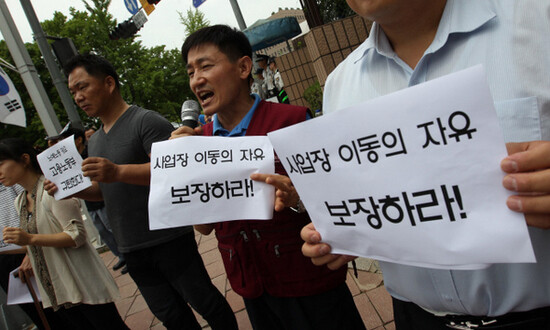hankyoreh
Links to other country sites 다른 나라 사이트 링크
Migrant workers report physical abuse, wage discrimination

By Choi Sang-won, South Gyeongsang correspondent
A recent survey reported that 13.8% of migrant workers in South Korea had suffered physical abuse in the workplace.
A day ahead of International Migrants Day (Dec. 18), the South Gyeongsang Migrant Community Center released the results of a survey of 449 migrant workers living in South Gyeongsang Province. The workers were asked about the conditions of their work and life in Korea. The survey showed that 13.8% of respondents had been beaten at work. Almost half of those who struck them were South Korean coworkers. Inability to understand the Korean language was reported to be the biggest reason (25.6%) for the abuse.
The biggest complaint, however, harbored by migrant workers was wage discrimination (24.4%), which was more common than inhumane treatment (21.1%). The average monthly salary for migrant workers this year stood at around 1.6 million won (US$1,492). The salary for migrant workers first surpassed the 1 million-won mark in 2003, and has gradually increased since 2005.
However, that salary is still 300,000 won (US$280) less than that of South Korean manual workers of the same age who work the same number of hours. Average monthly wages for migrant workers increased 1.35% from a year earlier, but the real wages have actually dropped due to a 3-4% rise in consumer prices. The monthly average amount of money that migrant workers send to their homeland stood at around 1.05 million won, or two thirds of their income. 32.4% of surveyed workers said their average cost of living was between 210,000 and 300,000 won, the most common answer.
The average daily working hours were reported to be 11.01 hours. The average working days a week, picked by the greatest number of respondents, or 28.1%, was six days.
In terms of academic background, 81.3% of respondents said they had achieved an education level of high school or beyond. 20.5% of respondents said they entered South Korea in 2010, 18.9% in 2011, and 14.7% in 2012, meaning more than half of respondents had spent less than three years in South Korea. The amount of time until they entered South Korea after applying for a visa was 12.3 months on average. The amount of money they gave to brokers or agencies who brought them to South Korea was a staggering 5.35 million won (slightly less than US$5,000) on average. Aside from the official expenses, 17.1 percent said they had needed to bribed brokers or civil servants in their home countries an average amount of 2.84 million won (US$2,650).
Assistant administrator of the Gyeongnam Migrant Community Center, Jung Mun-sun said, “The South Korean policy to import foreign labor was put into practice to fill job vacancies, but has now shifted into a means of acquiring cheap labor. As such, a distorted industrial structure and policies of racial discrimination will become a huge burden in the near future.”
Please direct questions or comments to [english@hani.co.kr]

Editorial・opinion
![[Editorial] Does Yoon think the Korean public is wrong? [Editorial] Does Yoon think the Korean public is wrong?](https://flexible.img.hani.co.kr/flexible/normal/500/300/imgdb/original/2024/0417/8517133419684774.jpg) [Editorial] Does Yoon think the Korean public is wrong?
[Editorial] Does Yoon think the Korean public is wrong?![[Editorial] As it bolsters its alliance with US, Japan must be accountable for past [Editorial] As it bolsters its alliance with US, Japan must be accountable for past](https://flexible.img.hani.co.kr/flexible/normal/500/300/imgdb/original/2024/0417/6817133413968321.jpg) [Editorial] As it bolsters its alliance with US, Japan must be accountable for past
[Editorial] As it bolsters its alliance with US, Japan must be accountable for past- [Guest essay] Amending the Constitution is Yoon’s key to leaving office in public’s good graces
- [Editorial] 10 years on, lessons of Sewol tragedy must never be forgotten
- [Column] A death blow to Korea’s prosecutor politics
- [Correspondent’s column] The US and the end of Japanese pacifism
- [Guest essay] How Korea turned its trainee doctors into monsters
- [Guest essay] As someone who helped forge Seoul-Moscow ties, their status today troubles me
- [Editorial] Koreans sent a loud and clear message to Yoon
- [Column] In Korea’s midterm elections, it’s time for accountability
Most viewed articles
- 1[Column] The clock is ticking for Korea’s first lady
- 2Samsung barricades office as unionized workers strike for better conditions
- 3[Editorial] When the choice is kids or career, Korea will never overcome birth rate woes
- 4[News analysis] After elections, prosecutorial reform will likely make legislative agenda
- 5Why Israel isn’t hitting Iran with immediate retaliation
- 6S. Korea, Japan reaffirm commitment to strengthening trilateral ties with US
- 7[Editorial] Does Yoon think the Korean public is wrong?
- 8[Guest essay] How Korea turned its trainee doctors into monsters
- 9[Editorial] 10 years on, lessons of Sewol tragedy must never be forgotten
- 10Strong dollar isn’t all that’s pushing won exchange rate into to 1,400 range